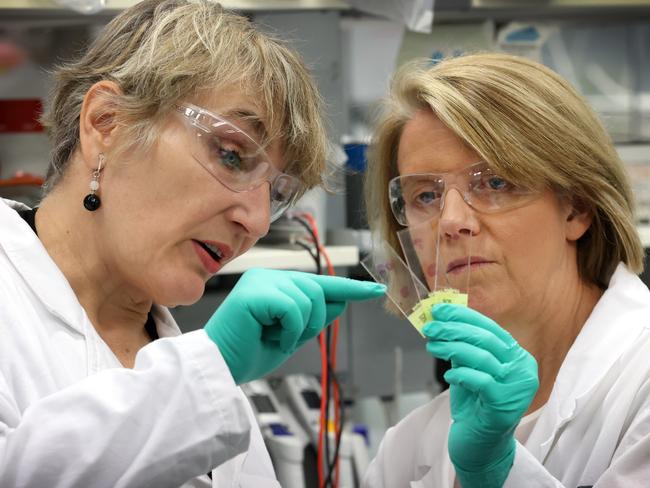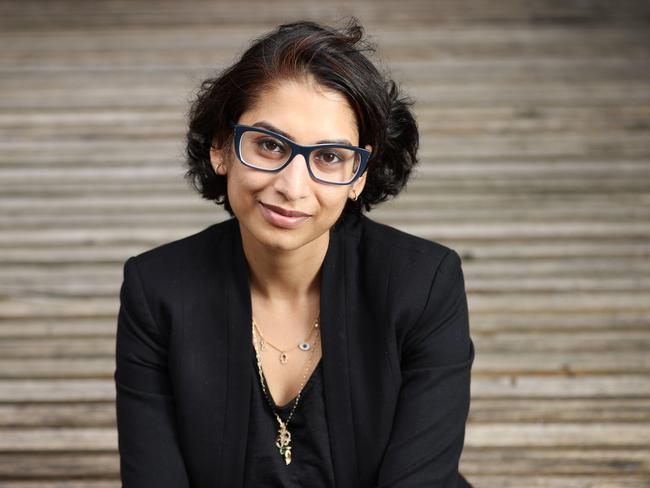How Melbourne scientists are working to create vaccine-style treatment for ovarian cancer
Melbourne scientists’ efforts to develop a vaccine-style treatment to combat a deadly kind of cancer have been given a major funding boost.
Victoria
Don't miss out on the headlines from Victoria. Followed categories will be added to My News.
Efforts to develop a vaccine-style treatment to combat ovarian cancer have been bolstered by increased funding to push the research in Melbourne.
Scientists led by the Walter and Eliza Hall Institute are scanning the way “super-responders” are able to overcome ovarian cancer with immunotherapies more effectively than others to target the weak links in the disease’s defence.
As the team led by Professor Clare Scott continues to unmask the proteins forming in cancer cells that best respond to treatment – and which can be most effectively targeted by future vaccine-style treatments – their efforts have been bolstered by a $500,000 state government grant designed to ensure the breakthrough research remains in Victoria.
With 14,000 Australian women diagnosed with ovarian cancer each year, and 70 per cent later experiencing a recurrence, Professor Scott said it was vital the promising Melbourne SOLACE2 trial is supported so that it can be commercialised for use in future patients.

Already running for four years, the SOLACE2 trial is analysing the immune response of 114 women with recurrent ovarian cancer, detecting several key differences in their reaction so that treatments can be designed to one day suit all.
“We’re aiming to understand who does best and then we can work out how we go back and make the other women do better,” Professor Scott said. “People have been trying to do or doing vaccines for years and failed.
“What we’re doing differently is trying to identify things in these women – and we’ll have multiple women who do well on the trials – so it’s really giving us a complex group from which to understand the rules.
“We want to understand what that is telling us about how we should be designing ovarian cancer vaccines.”
The WEHI-led project is one of 21 being backed under the fifth round of the Victorian Medical Research Acceleration Fund, which sees $3.4 million provided to accelerate the search for new dementia care, diabetes treatments, IVF treatments and breast cancer research.
Minister for Medical Research Jaala Pulford said future treatments and cures would not be possible unless scientists are backed.
“Investing in local research keeps Melbourne among the best in the world, like Boston and London, for advancing medical breakthroughs,” Ms Pulford said.

Dr Srividya Iyer, 36, knew little about ovarian cancer until 8.30pm on August 31, 2020. But since that moment – when a CT scan at the Peter McCallum Cancer Centre where she worked as a dentist revealed she had she had stage 3 ovarian cancer – Dr Iyer has been desperate for more research to overcome the disease.
“Within two hours of presenting to ED, at about 8.30pm, I saw the doctor’s face change. I knew something was up,” she said.
“He said it had spread to my abdomen. That is when it really hit me hard.
“I had no predisposing factors or risk factors to cause ovarian cancer, there so it was absolutely a big shock.”
After six rounds of chemotherapy followed by surgery Dr Iyer is now taking a drug known as a PARP inhibitor, which is intended repair DNA and prevent the cancer cells coming back.
But with a two-year-old daughter Dr Iyer is desperate for better future treatments for herself and other women.
“Ovarian cancer treatment hasn’t changed – for last 30 years it is the same,” she said.
“I think this (the SOLACE2 trial) is going to pave that path towards potential vaccines and potential cure for this deadly cancer. We need to research, we need this trial, to be able to give these answers to all the women, that there is some hope and that this is not a death sentence.”



